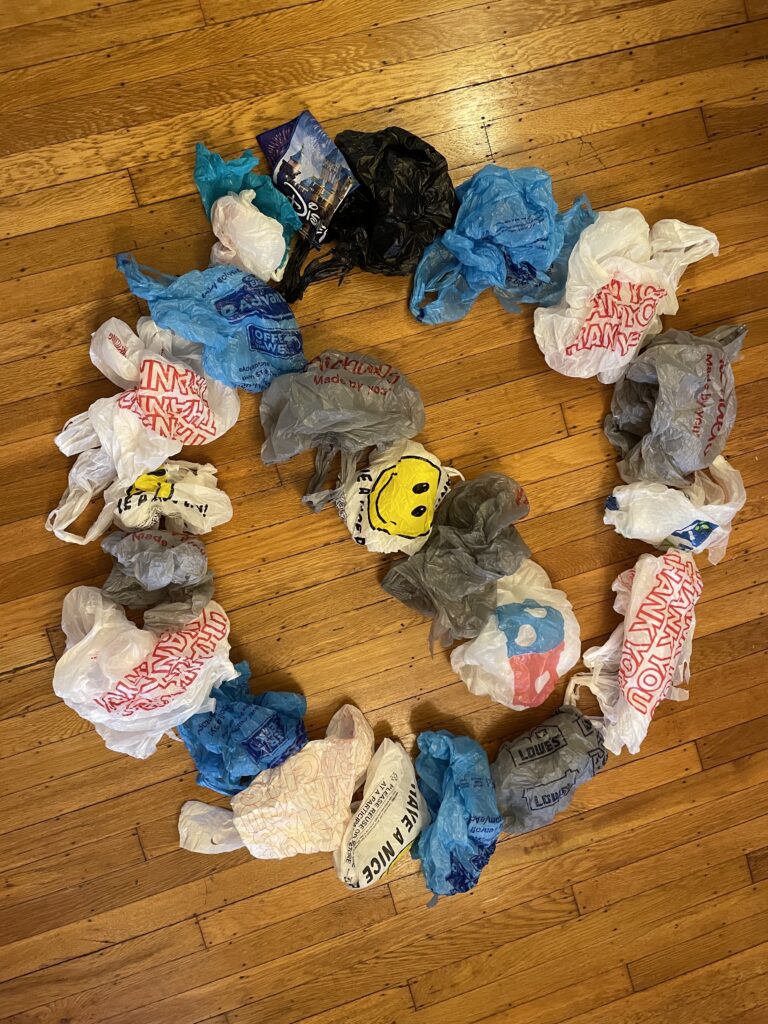by Becca Stallings
Beginning October 14, 2023, Pittsburgh retail establishments stopped placing purchases in single-use plastic shopping bags. Businesses are allowed to sell paper bags (minimum 40% recycled content) for 10c each.
Why?
Single-use plastic (SUP) is a serious environmental issue, but why target shopping bags in particular?
- American consumers use 4.2 million tons of plastic film each year. Yes, bags are just one of the types of plastic waste, but there are a lot of them, and every reduction in SUP makes a difference!
- Shopping bags, which are lightweight and have handles, easily get free from their intended locations, blow around our environment, get caught in trees and plants, strangle animals, and break down into microplastics.
- Plastic bags are dangerous to babies, young children, and pets because the thin plastic can be sucked over nose and mouth, causing suffocation. Bags with handles are particularly hazardous because the handles can tangle around a hand or ear, impeding efforts to get free; handles also can get around the neck of a small animal.
- Plastic recycling is not an effective solution to the plastic problem. Some plastic bags do get recycled, and it’s better than not recycling, but bags have to be “downcycled” into a different product: It is not possible to make new SUP shopping bags out of old ones.

How can we bring our groceries home?
The simplest solution is to bring your own bags to the store! PASUP shared tips on how to use your own bags in a pandemic–and it’s easier now that stores are more accepting of reusable bags.
If you don’t have nice durable cloth bags, you can bring back your plastic or paper bags from a previous shopping (even at a different store) and use them again.
If you forgot your bags or you’re making an unplanned purchase, see if you can carry the purchased items in your arms, backpack, car, or bicycle basket. If not, you’ll have to pay 10c for a paper bag and remind yourself to bring bags in future.
Is this unfair to the poor?
The 10c fee for paper bags is not charged to customers using SNAP, WIC, or other benefit programs to pay for their purchase. City Council is working on a program for sharing reusable bags to increase access for those who can’t afford to buy them.
Does this mean I can’t buy plastic sandwich bags or garbage bags?
No, those are not covered by the ban. Neither are the small SUP bags many stores offer for produce, deli foods, or other things that you bag before taking them to the cashier. You can reduce your use of these bags by choosing reusable options or reusing other bags for your trash. Local business Our Children Our Earth offers many reusable alternatives to sandwich bags, plastic wrap, produce bags, etc.
Does this mean stores won’t collect SUP bags for recycling?
No, plastic film recycling bins are still available to collect the plastic from packages, bubble wrap, produce bags, etc! Plastic film cannot go in curbside recycling but is accepted in bins at most locations of Giant Eagle, Target, and Lowe’s. (I recently learned that the Greenfield Giant Eagle has blocked access to its plastic-bag recycling bin. It’s unclear whether this is temporary or permanent and whether it has any connection to the ban–it’s more likely a response to consumers throwing unrelated garbage into the bin.)
But I was reusing those plastic bags! What will I do now?
Either you’ll find an alternative to plastic, or you’ll use another source of SUP bags. If you feel that plastic is the best material for the job, look at the plastic packaging you’ve been recycling/discarding and set aside appropriate-sized pieces. Are you so good at avoiding SUP that you don’t have enough to reuse? Ask your neighbors for theirs, or pull some out of the bin outside a store! Buying “compostable” or “biodegradable” bags is not a great solution unless you are willing to bury the bags in your own yard or to pay for commercial composting that will accept them.
Why are stores still giving me so much plastic?
Your items aren’t placed in plastic shopping bags anymore, but a typical grocery run still brings home lots of plastic bags, wraps, blister-packs, caps, spouts, “safety seals”, and so forth. It’s frustrating! PASUP opposes all of this! Shopping bags are just one item to tackle. If this ban isn’t making any difference in your life–because you’d already been bringing your own bags for years–pat yourself on the back and keep looking for ways to reduce SUP.
Banning plastic shopping bags in Pittsburgh was one of the first ideas proposed when PASUP began in 2019. We are glad that it’s finally happened, eager to support this lifestyle change in Pittsburgh, and ready to tackle other forms of SUP!
